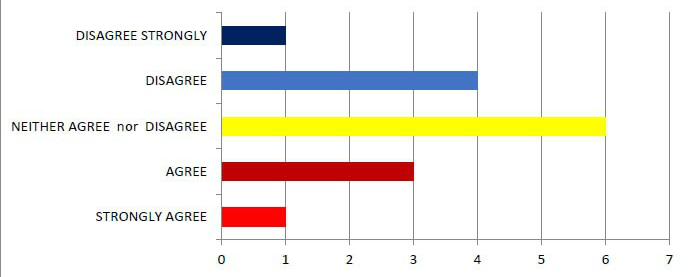
Among the world’s rich countries, those that are smaller and more socially cohesive tend to have happier populations on average. That is the consensus finding of a survey of leading researchers on wellbeing from around the world.
But opinion is divided among the experts on whether the break-up of large, diverse countries into smaller, less diverse ones can be expected to increase national wellbeing. One researcher comments that Catalonia might be an interesting experiment if it were to gain independence.
Smaller countries = happier countries?
In the latest round of the World Wellbeing Panel monthly survey, the 15 wellbeing experts from economics, sociology and psychology who responded to the survey were first asked whether they agree with the following statement:
Figure 1. Statement: Within the group of richer countries, smaller countries and more social cohesive countries have happier populations on average.

The consensus is clear: 14 out of 15 wellbeing experts either agree or strongly agree that within the group of richer countries, smaller countries and more social cohesive countries have happier populations on average
David Blanchflower (Dartmouth College) cites evidence that Nordic countries are happiest, although they also have high suicide rates.
Wenceslao Unanue (Universidad Adolfo Ibáñez, Chile) says that cohesion is important for both more and less affluent people, but the effect of social cohesion on subjective wellbeing is stronger for citizens living in the richer parts of Europe in comparison with those living in the less affluent parts.
Jan-Emmanuel De Neve (University of Oxford) notes that the data appear to point in this direction, and much is to be said for social capital driving wellbeing. But it is still a complex matter for policy-makers and requires further study.
Paul Frijters (Centre for Economic Performance, London School of Economics) points to evidence from the Gallup polls and the World Value Survey that higher levels of happiness tend to be observed for small and cohesive countries in the West.
For example, in the 2014-2016 Gallup poll, the top six happiest countries were Norway, Denmark, Iceland, Switzerland, Finland and the Netherlands. In the World Value Survey of 2015, the happiest of the richer countries included Iceland, Ireland, the Netherlands and Denmark.
These small, rich countries have strong welfare systems, which means the poor are looked after, hence socially cohesive. They are markedly happier than the larger rich countries, such as the United States, the UK, Germany, Japan, Italy and France, which reflects an old finding in sociology and economics: that cohesive communities have high levels of cooperation and public goods.
Breaking up is hard to do?
The second statement that the experts were asked about was as follows:
Figure 2. Statement The break-up of large, diverse, countries into smaller, less diverse, countries can be expected to increase the wellbeing of the populations in the longer run.

The responses to this question are more diverse. Out of 15 wellbeing experts, six express no strong opinions. Five either disagree or strongly disagree, and four either agree or strongly agree with the statement.
Among panel members who disagree with the statement, Mariano Rojas (Universidad Popular Autónoma del Estado de Puebla of Mexico) believes that although there is a correlation between being a smaller country and higher population wellbeing, it may not imply causation and any intervention could generate complex social and cultural processes that need to be taken into consideration.
Heinz Welsch (University of Oldenburg) states that national or regional identity is just one of many variables with respect to which people differ, and that many important social divisions (material and cultural/attitudinal) run across national/regional identity, which are also important to people’s sense of wellbeing.
Among panel members who either agree or strongly agree, Ada Ferrer-i-Carbonell (Barcelona Graduate School of Economics) says that it seems to be generally true that larger countries have more differentiated groups (for example, cultural or regional differences) and this usually leads to less social cohesion.
Thus, if large, diverse countries are to break up into smaller countries that are more homogenous, social cohesion and thus wellbeing might increase, after an initial period of change and adaptation. If we were to have good data, Catalonia might be an interesting experiment in case of independence.
Bruno Frey (University of Basel) believes that the break up of a large, diverse country could also force the government to take into account to a larger degree the preferences of the population.
♣♣♣
Notes:
- This blog post is based on The World Wellbeing Panel on wellbeing and the impact of country size and social cohesion on happiness
- The post gives the views of its authors, not the position of LSE Business Review or the London School of Economics.
- Featured image credit: Mölle Harbour, Sweden, by Juha Riissanen, under a CC-BY-NC-SA-2.0 licence
- When you leave a comment, you’re agreeing to our Comment Policy.
 Tony Beatton is Honorary Professor at RMIT University’s Department of Economics, Finance and Marketing
Tony Beatton is Honorary Professor at RMIT University’s Department of Economics, Finance and Marketing
 Paul Frijters is Professorial Research Fellow of the Wellbeing Programme at LSE’s Centre for Economic Performance, taking over from Professor Richard Layard. Paul also heads the World Wellbeing Panel. He did his PhD on welfare and wellbeing in Russia, after a Masters in Econometrics. He has worked in a variety of roles on very different problems, such as urban-to-rural migration in China (where he headed a large international research program), corruption, applied econometrics, and wellbeing. He was voted ‘best economist under 40’ by the members of the Economic Society of Australia in 2009-2011. His works have been discussed in the New York Times, Washington Post, the BBC, etc.
Paul Frijters is Professorial Research Fellow of the Wellbeing Programme at LSE’s Centre for Economic Performance, taking over from Professor Richard Layard. Paul also heads the World Wellbeing Panel. He did his PhD on welfare and wellbeing in Russia, after a Masters in Econometrics. He has worked in a variety of roles on very different problems, such as urban-to-rural migration in China (where he headed a large international research program), corruption, applied econometrics, and wellbeing. He was voted ‘best economist under 40’ by the members of the Economic Society of Australia in 2009-2011. His works have been discussed in the New York Times, Washington Post, the BBC, etc.
 Nattavudh (Nick) Powdthavee holds a joint position as Professor of Behavioural Science, Warwick Business School, and a Principal Research Fellow in the WellBeing research programme at the Centre for Economic Performance at the LSE. He obtained his PhD in Economics from the University of Warwick in 2006 and has held positions at the University of London, University of York, and Nanyang Technological University in Singapore. He is the author of the popular economics book The Happiness Equation: The Surprising Economics of Our Most Valuable Asset. Click here for his website.
Nattavudh (Nick) Powdthavee holds a joint position as Professor of Behavioural Science, Warwick Business School, and a Principal Research Fellow in the WellBeing research programme at the Centre for Economic Performance at the LSE. He obtained his PhD in Economics from the University of Warwick in 2006 and has held positions at the University of London, University of York, and Nanyang Technological University in Singapore. He is the author of the popular economics book The Happiness Equation: The Surprising Economics of Our Most Valuable Asset. Click here for his website.





